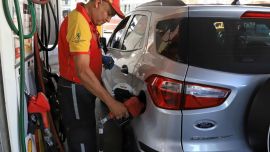Argentina’s lurch to the left under new President Alberto Fernández is proving a bitter pill to swallow for much of the middle class, with the wallet-draining Christmas season in full swing.
The Frente de Todos was swept to power in October’s elections on the wave of antiausterity sentiment in a country gripped by an 18-month economic crisis following a currency crash. While his victory brought hope, that has quickly turned to dismay for many taken aback by a series of taxes imposed on the US dollar, the currency Argentines favour for their savings.
On Tuesday, Economy Minister Martín Guzmán announced a 30 percent levy on foreign currency purchases to protect “highly vulnerable” sectors.
Social media is abuzz with indignation over the “authoritarian” measure, which is already scheduled for debate in the lower house Chamber of Deputies.
Hundreds demonstrated outside Congress on Wednesday shouting “Yes, we can” – former president Mauricio Macri’s campaign slogan, popularised by Barack Obama ahead of the 2008 US election.
On Twitter, critics denounced left-wing policies they fear will drag Argentina down the road Hugo Chávez took Venezuela, which has suffered one of the worst economic collapses outside of war in modern history.
“Alberto’s going for the Chavista model: concentration of power, political absolutism, high taxes, asphyxiating the middle classes and the productive sector,” claimed Gregorio Hernández Maqueda, a Civic Coalition political leader from Córdoba, in a tweet this week.
‘TOURIST DOLLAR’
One of the most controversial moves is the return of what Argentines call the “tourist dollar.” A 30 percent tax is being applied on purchases made abroad by credit card as well as withdrawals made in foreign countries. Services such as Netflix and Spotify are also affected by the tax.
“I booked a foreign trip many months ago... This 30 percent tax makes it difficult to stick to my budget, as well as not being able to use cards during the trip,” said kindergarten teacher Nathalie Goldstein, 24, who saved up for a year to travel to Barcelona.
It is not the first time an Argentine government has imposed such measures. Vice-President Cristina Fernández de Kirchner did something similar during her second presidential term from 2011-15, before Macri cancelled the policy.
Economic analyst and newspaper columnist Manuel Adorni accused the government of lying in a bid to convince the least affluent that the tourist dollar “will only affect the richest and that it will benefit them, without realising that they will get poorer.”
With the peso trading at 63 to the dollar, the tourist rate will cost Argentines around 80 pesos. A year and a half ago, the exchange rate was 18 to the dollar.
Aldo Elías, president of the Asociación de Hoteles de la República Argentina (AHT), a chamber of tourism, blasted a “very bad measure.”
He said it “puts at risk the work sources of almost 5,000 tourism businesses” and predicted that airlines would leave Argentina if the number of tourists heading abroad dries up.
However, Ernesto Oldenburg, a restaurant owner in Lobos, a city in Buenos Aires Province, around 70 miles (115 kilometres) from the capital, says the measure is an “incentive” for local-based tourism.
He expected more holidaymakers from Buenos Aires to head to Lobos’ popular lagoon, he said.
‘NO-ONE TRUSTS PESO’
Most Argentines keep their savings in dollars and much of that is held outside the country, to protect from a peso that has proved highly unstable. But the 30-percent tax will also be applied to savings in a bid to prevent a currency flight.
According to the Central Bank Argentines are holding US$43.7 billion outside the country, but that’s US$19 billion less than last year.
“No-one trusts the peso,” one 51-year-old housewife told AFP.
Argentina’s currency has lost almost 40 percent of its value during the last year. The economy is expected to shrink by around 3.1 percent in 2019, as inflation hovers around 55 percent, poverty near 40 percent and unemployment stands at 9.7 percent.
Fernández’s government has also said it will maintain the US$200-monthly limit on dollar purchases initiated by Macri.
It remains to be seen how
Argentines will react. After the
government increased taxes on
agricultural exports, the Confederation of Rural Argentines
announced plans to protest.related news
by BY MARIA LORENTE | AFP





















Comments